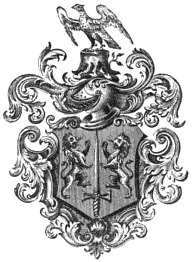Daniel Carroll (politician)
Daniel Carroll (born July 22, 1730 in Upper Marlboro , Prince George's County , Province of Maryland , † July 5, 1796 in Washington, DC ) was an American politician and one of the Founding Fathers of the United States . He was a cousin of Charles Carroll , who signed the American Declaration of Independence , and brother of John Carroll , who was the first Catholic bishop in the United States. Daniel was one of only five men to sign both the Articles of Confederation and the United States Constitution .
Early years
Daniel Carroll spent his early years on the family estate, Darnall's Chance , in Maryland. He then went to Europe , where he studied with the Jesuits at the College of St. Omer in Flanders between 1742 and 1748 . After returning to the United States, he only gradually became a patriot . As a large landowner, he was concerned that the revolution might fail economically, which would not only ruin his family financially, but also the common people. He was also initially prevented from holding public office by Maryland's laws, which forbade a Catholic from doing so. When these laws were repealed by the Maryland Constitution of 1776, the path was clear for his election to the House of Lords , where he served between 1777 and 1781. He was then a member of the Continental Congress between 1781 and 1784 . During this time he signed the Articles of Confederation in 1781. His commitment during the War of Independence , like that of other members of his noble family, was inspired by the old family motto: "Strong in Faith and War".
Constituent Assembly of 1787
Carroll was an active member of the constituent assembly despite the fact that illness prevented him from attending the early sessions. Like his good friend James Madison , he believed that a strong central government was required to regulate trade between states and other nations. Carroll also spoke out several times against the payment of members of the US Congress by the respective states. He argued that such remuneration would sabotage the power of the new government because
"the dependence of both Houses on the state Legislatures would be compleat .... The new government in this form is nothing more than a second edition of [the Continental] Congress in two volumes, instead of one, and perhaps with very few amendments "
He believed that government should rest with the people and so he joined James Wilson in his struggle for general sovereignty . When it was proposed that the US President be elected by the US Congress, it was Carroll, supported by James Wilson, who suggested that the legislature should replace the words with the people . He was one of only two Roman Catholic delegates who signed the constitution.
Carroll stayed away from the constituent assembly until July 9, but attended regularly thereafter. He spoke over 20 times during the debates and served on the Committee on Postponed Matters . After the meeting, he returned to Maryland, where he advocated ratification of the US Constitution. He was not a delegate to the later Maryland Constituent Assembly.
Another résumé
After the meeting, Carroll followed state and national concerns. He was a key figure in the Maryland ratification process. He also defended the constitution in the Maryland Journal , particularly in his response to the arguments of the well-known anti-federalist Samuel Chase . After ratification in Maryland, Carroll represented the sixth constituency in the first US Congress , where he was interested in economic and fiscal stability. In this context, he agreed to the acceptance of the national debt by the federal government.
He later served again in the Maryland Senate and was one of three appointed commissioners in the District of Columbia . He was then a commissioner (co-mayor) of the new capital, but his advanced age and poor health led to his resignation in 1795. After that he was interested in the welfare of his region. In his final years, he was one of George Washington's partners in the Patowmack Company, an enterprise intended to connect the central states with the expanding west through the Potomac River Canal.
Web links
- Daniel Carroll in the Biographical Directory of the United States Congress (English)
- Daniel Carroll on the United States Army Center of Military History page
| personal data | |
|---|---|
| SURNAME | Carroll, Daniel |
| BRIEF DESCRIPTION | American politician |
| DATE OF BIRTH | July 22, 1730 |
| PLACE OF BIRTH | Upper Marlboro , Maryland |
| DATE OF DEATH | July 5, 1796 |
| Place of death | near Washington, DC |


